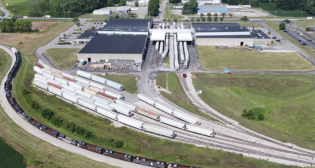
STB’s FMLM Mounting Minutiae Mountain
Written by William C. Vantuono, Editor-in-Chief
Shutterstock
The paperwork, or “mountain of minutiae,” as some observers see it, continues to pile up at the Surface Transportation Board as a growing list of hearings, complaint filings, litigation and proposed rulemakings continues to occupy the rail industry’s time and resources.
The latest addition to the pile, following the marathon 10-hour Feb. 15-16 hearing on Amtrak Gulf Coast service, is STB’s inquiry into FMLM (First-Mile, Last-Mile) service. The Board on Sept. 2, 2021 issued a decision (Docket No. EP 767) inviting comment on issues regarding FMLM from rail shippers, carriers and the public “concerning what, if any, FMLM issues they consider relevant, whether further examination of FMLM issues is warranted, what, if any, actions may help address such issues, taking into account the information shippers already receive from carriers, and whether metrics to measure FMLM service that are not now being reported to the Board might have utility for the supply chain, and the potential burdens associated with any such reporting.”
“Various shipper groups have within the past year raised concerns to the Board about FMLM service and requested greater transparency of FMLM data,” STB noted at the time. “In addition, in recent months, the Board has heard from various stakeholders regarding crew shortages and other issues stemming from the COVID-19 pandemic and worldwide supply chain complications, all of which have heightened the importance of the Board exploring FMLM service. “
All comments and replies, which were due Feb. 17, are in from numerous parties: the Western Coal Traffic League, Freight Rail Customer Alliance, National Coal Transportation Association, Portland Cement Association, and Steel Manufacturers Association (jointly, “Shipper Associations”); Private Railcar Food and Beverage Association; Industrial Minerals Association North America; BNSF; CSX; Association of American Railroads; Norfolk Southern; American Short Line and Regional Railroad Association; American Train Dispatchers Association, Brotherhood of Maintenance of Way Employes Division/IBT, Brotherhood of Railroad Signalmen, International Association of Sheet Metal Air Rail and Transportation Workers Mechanical Division, International Association of Sheet Metal Air Rail and Transportation Workers Transportation Division, National Conference of Firemen and Oilers 32BJ/SEIU (jointly, “Unions”); CN, The American Chemistry Council, American Fuel and Petrochemical Manufacturers, and The Fertilizer Institute (jointly); National Grain and Feed Association; International Liquid Terminals Association; Institute of Scrap Recycling Industries; USDOT; U.S. Dept. of Agriculture; American Petroleum Institute; Diversified CPC International; National Propane Gas Association; National Industrial Transportation League; Glass Packaging Institute; and Kansas City Southern.
Download a consolidated PDF of all filings:
A few excerpts:
• AAR: Railroads operate as one part of an interconnected, continent-spanning network. This network leads from real origin to final destination (not just railroad origins and destinations) and likely involves more than just one railroad and more than one mode of transportation. Indeed, the first and last rail miles are often the middle miles of freight’s journey.Now more than ever, railroads and society at large are appreciating that to function smoothly, every link in the supply chain must work in a precisely coordinated sequence. Numerous actors and variables in those movements can impact the FMLM service of the participating railroads. A disruption in one region can impact the FMLM rail service of another region. Disruptions anywhere caused by other supply chain participants could negatively affect the FMLM service provided by a Class I railroad. The Board must be able to account for these factors in any data collection or reporting regime and should consider the extent to which it can obtain information regarding other modal participants. Additionally, FMLM service, like all rail service, is also impacted by the fact that railroads operate an outdoor plant. Unforeseen circumstances, like wildfires, flooding, washouts, hurricanes, accidents, or severe weather events, can arise on the railroad creating delays and unsafe operating conditions. By their very nature, such events are unpredictable and can wreak havoc on the railroad and its ability to provide service. Similarly, with trackage and facilities being outdoors, maintenance is integral to safety. The amount of maintenance or the need for maintenance depends upon factors like the usage of the line and the weather impacts of the line. Certainly, more maintenance and/or inspections are required when the line carries more volume or is in specific geographic regions or climates. These variables should also be recognized in any proposed data collection intending a fair assessment of FMLM service. Finally, FMLM service is heavily dependent on coordination with shippers and receivers. Indeed, what makes FMLM different than line-haul transportation is the need for railroads to coordinate with a wide range of entities to tender or receive rail cars. Any metric or reporting of FMLM service issues must account for shipper’s or receiver’s actions that can frustrate FMLM service. For example, if a shipper notifies the railroad the cars are ready to be picked up, but the cars have not actually been set out, the railroad may come on its scheduled day to find facility gates locked and cars unavailable to be pulled. This could mean the shipper does not get service again for another day or two. A receiver may also not be prepared to take a shipment given its inability to clear space in its facility, thereby leaving the railroad to deliver at a different day or time. Rail terminals are focused on throughput and the smooth functioning of terminals depends on receivers maintaining a consistent flow of freight out of rail facilities to make room for other freight moving in. Rail terminals are simply not designed for, and are not physically capable of, long-term storage of cars or commodities, and it is imperative that shippers be ready to receive their cars and receivers be prepared to accept their deliveries. If they are not, the impacts can reverberate throughout the supply chain, ultimately affecting service in other regions or areas. To obtain a full understanding of FMLM service issues, the Board must measure shipper or receiver actions that impact FMLM service and tailor its reporting to incorporate that information as well.
• Shipper Associations: While only the carriers know exactly what data they already track, the additional burden of tracking and reporting the additional data should not be disproportionate. In order to track trip plan compliance, the railroads must necessarily collect data on the total transit time, and they already report time between terminals. Of necessity, the first-mile/last-mile metrics must already be collected to gauge trip plan compliance. Moreover, it is very difficult to imagine that they could be running their networks and terminals effectively without having such information at their disposal, especially as they have promised that the implementation of PSR actually means that they will provide “scheduled” and “precis[e]” service. The additional burden, if any, should not be significant, especially compared to the disruption that the adoption of PSR inflicted, and continues to inflict, on many shippers. Shipper Associations believe that it is most important to begin with the Class I railroads since they directly handle the overwhelming portion of traffic originations and deliveries, meaning the first miles and the last miles. For Class II and Class III carriers, it is appropriate to begin with a single aggregate figure for trip plan compliance, with some opportunity for carriers to seek an exemption and for shippers to seek greater detail. Class II and III carriers are supposed to be more customer-oriented, and their activities consist more of FMLM activities to begin with, but shippers have definitely experienced problems with Class II and Class III carriers.12 Class II carriers are sufficiently large to have the resources to be able to provide the information, and many Class III organizations are part of larger, sometimes very large, railroad families, which should also have the capability to provide the needed information. There may be some individual Class II or Class III carriers for which the information is not needed or readily available or may represent a disproportionate burden. In such cases, the carrier should be allowed to apply for an individual exemption, to which other parties would have an opportunity to reply. This waiver approach is more appropriate than a blanket exclusion, especially as Class II and Class III carriers are also subject to the common carrier obligation to provide service upon reasonable request.
• ASLRRA: It is vague what additional metrics are envisioned by the Shipper Group, ACC, and TFI. Further, it is unclear whether data relevant to such metrics currently exist, and whether such data would provide any reliable and meaningful information to the Board, especially whether carriers are meeting their common carrier obligations “in the aggregate.” Variability in data collection, reporting systems, and abilities across the national network would result in inconsistent and nonmeaningful information for customers seeking to compare their service to others. ASLRRA urges the Board not to require short line railroads to create systems to track and report uniform metrics. Not only is it unclear what, if any, metrics are suggested or what, if any, benefits metrics would provide, the adverse effects of imposing such a mandate would be a serious financial blow to small railroads, and thus potentially to the customers that they serve. ASLRRA suggests that there is no indication that short line railroad FMLM service to short line customers is a problem that needs fixing, and also suggests that there is no particular set of data or metrics or particular tracking or reporting system that would be feasible or realistic to require of 600 different and distinct small businesses that are already laser focused on providing excellent customer service every day.
• Unions: Up until recently, it was nearly universal that persons who became employed as rail workers stayed employed in the industry for their entire careers. That has changed as Class I railroads have moved to a new ruthless cost-cutting business model (of which so-called precision scheduled railroading is a part) which prioritizes profit maximization and shareholder returns above all else. Under this new model, operating ratio drives all decisions, and service has become a minor consideration. The drive for ever lower operating ratios has led to dramatic reductions in employment which has, in turn, led to deterioration of service to shippers, which is a significant factor in the service complaints that motivated the Board to open this proceeding. The Unions support the Board’s initiation of this proceeding and they support requiring reporting of FMLM data because the railroad industry has gone from being a customer service industry to a “customer serves us” industry. The Unions support industry growth and quality service to its customers. The Unions believe that requiring reporting of FMLM information will help shippers, the Board, the and the public better assess the quality and timeliness of rail service and is a good first step toward restoring service to its proper place in the industry. Actual delivery and pick-up of cars is one useful measure for assessing service; that is the ultimate product the railroads are to supply for their customers.
• KCS: One downside to any proposal to collect FMLM data is that doing so could freeze the data in a form that is not as useful to customers as it could be, and potentially not as accurate. For example, after the Board began collecting data in Ex Parte 724, KCS determined that some of the data the Board wanted was not the most accurate reflection of our operations, so we changed how those metrics are reported on the KCS website. This has resulted, however, in KCS preparing one set of metrics for the Board and another—we think more useful—for our website. Any prescribed collection by the Board risks locking in a data methodology that may later be shown to be less than optimal or less useful, or risks railroads having to do extra work to satisfy the Board while satisfying their customers. KCS believes that there are differences among Class I’s in how they provide data to customers. For example, KCS provides trip plan compliance data to its customers, as do other carriers. However, KCS believes that differences exist among carriers on measuring intermodal performance at the container level versus by the well car; defining ‘on-time’ as within a certain period of the actual delivery target; whether non-revenue units are counted, and measurement of non-scheduled unit trains. Any sort of standardization of trip plan compliance data collected by the Board would require different carriers to rework their information systems, without any obvious benefit, while creating confusion for their customers who are accustomed to how their serving carrier provides performance information. Finally, KCS notes that it and other Class I’s have regularly scheduled conference calls with the Board’s Office of Public Assistance, Governmental Affairs and Compliance (OPAGAC) staff. KCS Operations personnel review the performance of KCS’s network, and answer specific questions about interchange operations, scheduled track maintenance, weather-related issues, and even specific questions about individual customer service. These calls present the perfect opportunity for Board staff to explore specific FMLM issues based on individual shipper concerns. KCS submits that such discussions would far better satisfy any need to remedy a specific problem than would aggregated data about hundreds or thousands of location-specific issues.
• BNSF: The common carrier obligation is a highly fact-specific requirement that a railroad act reasonably under existing circumstances to provide adequate service. Broad aggregated FMLM metrics cannot be used to assess compliance with such a fact-specific obligation. In general, “the Board tries to avoid micromanaging a carrier’s operational decisions.” This longstanding precedent is based on the Board’s recognition that service quality is driven by a multitude of factors, including network issues and conditions at specific locations. Moreover, shippers already have access to a toolbox of informal and formal remedies to address any FMLM service issues that may arise. Informal remedies include the Board’s Rail Customer and Public Assistance office and formal remedies include the Board’s formal complaint process. The Board should not inadvertently promote contentious and costly litigation over common carrier obligations by accepting the false premises that existing shipper remedies are inadequate or that aggregated data reporting would actually provide any value in such litigation.
• Norfolk Southern: Rather than attempting to address this issue with prescriptive regulation or additional reporting, the Board should encourage carriers to continue to innovate and develop platforms that give customers real-time shipment information and provide customers with advanced tools to manage their rail pipelines. Such technological tools allow for early identification of issues, including local service issues, and facilitate customer-friendly solutions that keep the rail network moving.
• Industrial Minerals Association: Generally, in reply to the railroads’ opposition comments, IMA finds it to be counterintuitive that they do not want to demonstrate how they perform for their customers. If the data would show that the railroads are doing a great job providing service, this would seem to be beneficial to the railroads. It would also seem to be a great marketing tool if a railroad’s on-time performance numbers were high. With respect to the AAR point about the many variables that can impact FMLM, IMA does not disagree that there are a wide variety of factors that go into FMLM service including weather and coordination with shippers and other transportation providers. However, that is the case with all of the performance data that is reported to the Board in EP 724 (Sub-No. 4). These factors, like in EP 724 (Sub-No. 4), can be dealt with in providing this data by making exceptions or understanding how these variables impact the data when analyzing the numbers. Moreover, regarding the AAR point about a better understanding of the purposes for the FMLM information, this argument seems somewhat disingenuous as various shipper groups have publicly expressed why this data would be helpful to them and the Board. Foremost, rail shippers have been subjected to unreliable service since the increased use of PSR began in 2017 along with large job cuts and need to have a better idea of how their railroads are performing. If one railroad has decided to make massive job cuts to its train and engine service employees, thereby resulting in unreliable service, shippers want to be aware of this situation and may want to use a different railroad that has not made these drastic changes to its ability to serve. Absent such data, the Board, shippers, and receivers lack relevant information as to how the rail networks are actually performing and whether carriers are providing, and shippers are receiving, adequate service.



